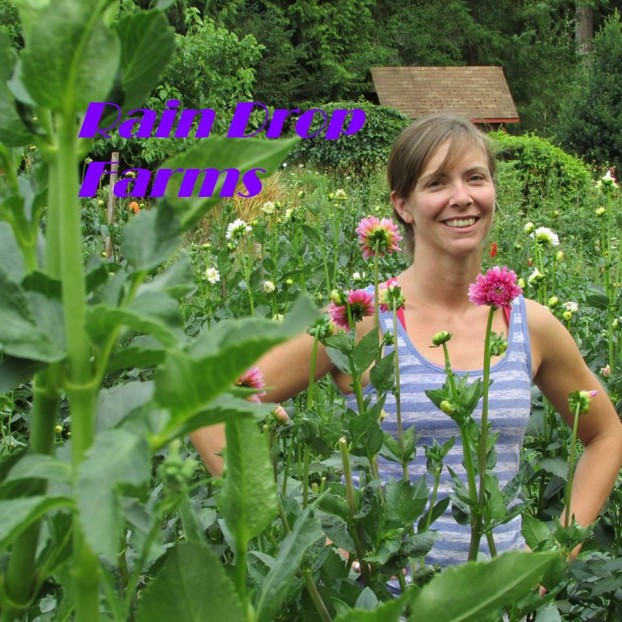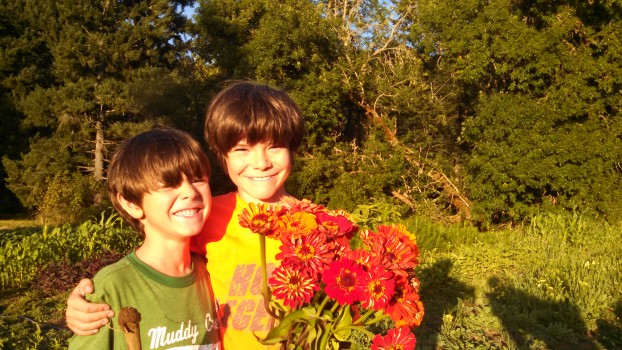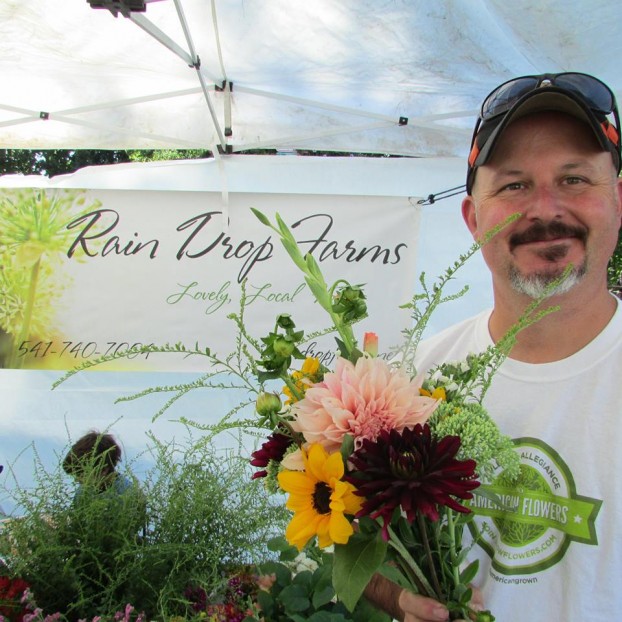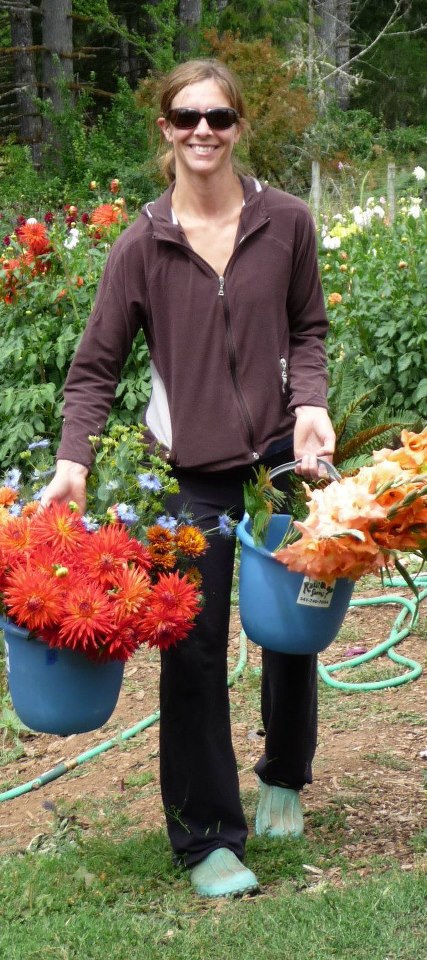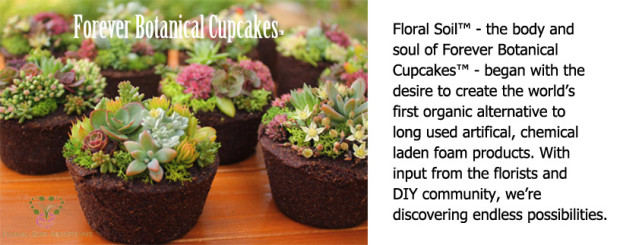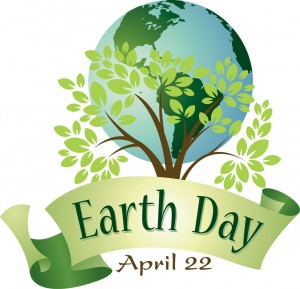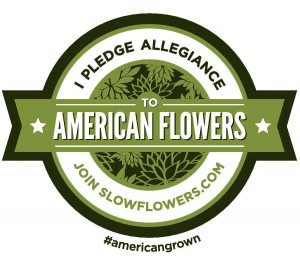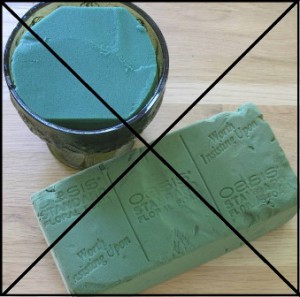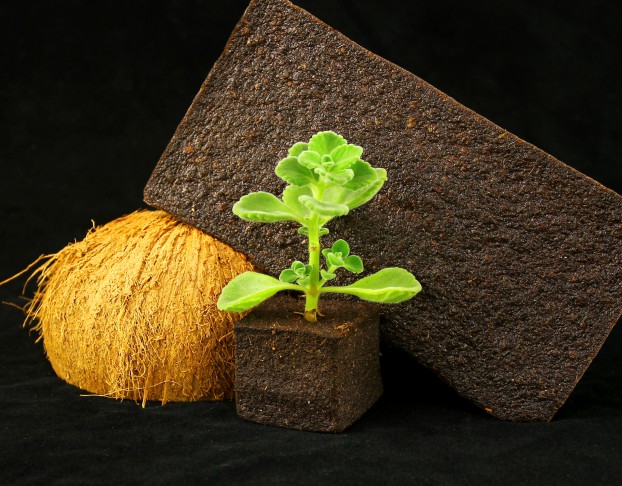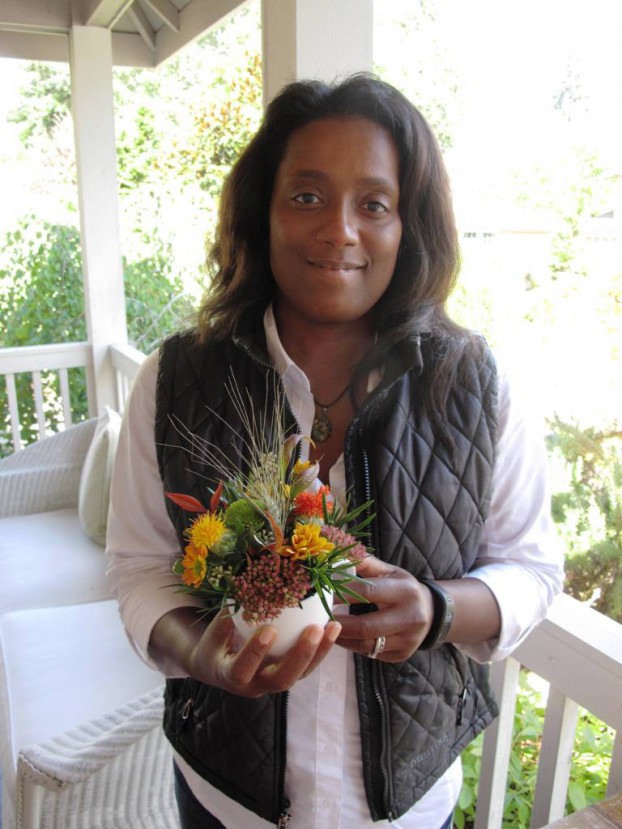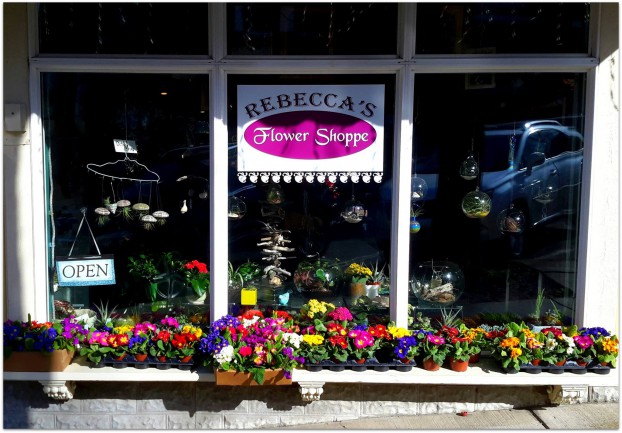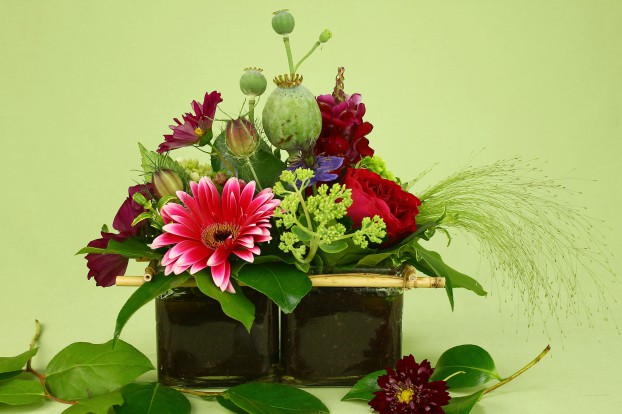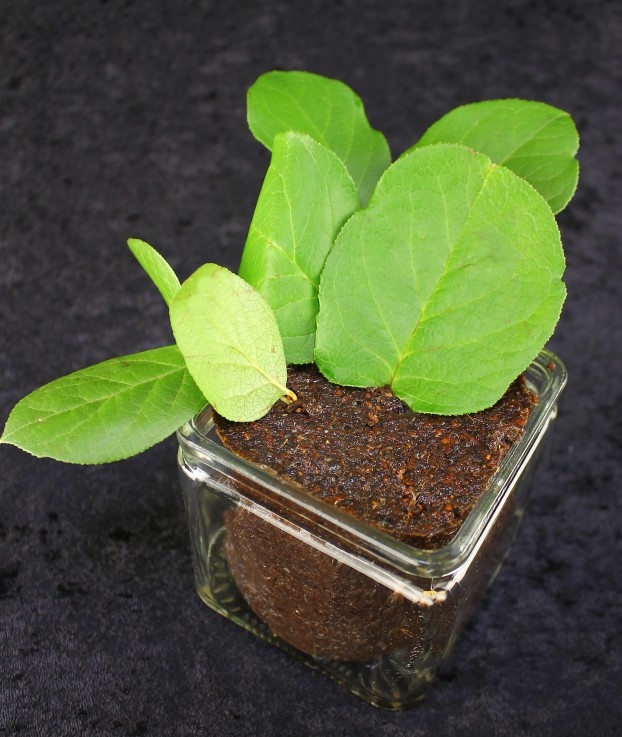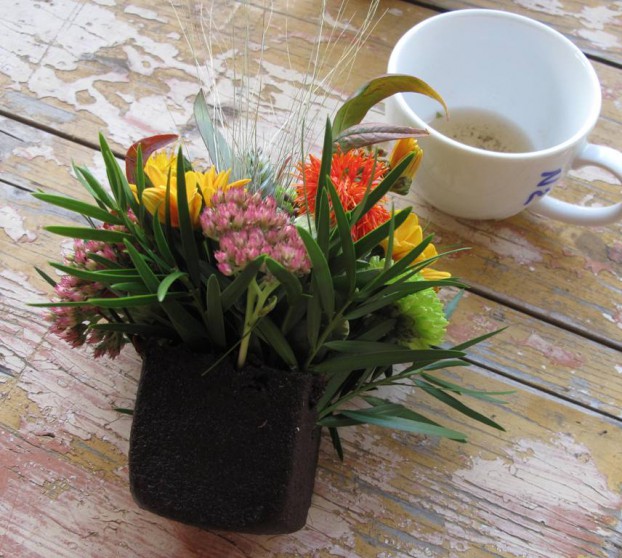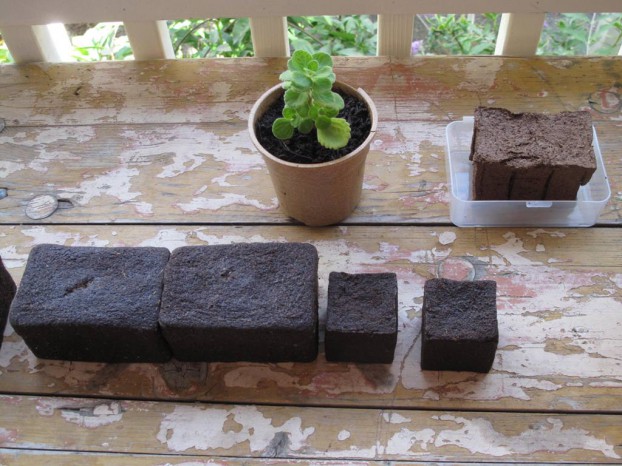Podcast: Play in new window | Download
Subscribe: Apple Podcasts | Podcast Index | RSS | More
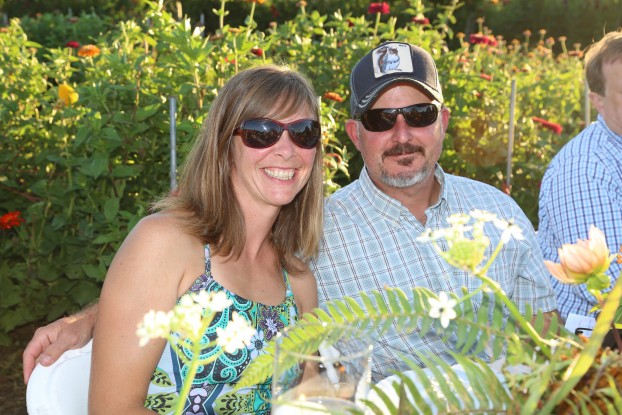
Erin and Aaron of Oregon’s Rain Drop Farms, photographed by Linda Blue at the Field to Vase Dinner on Sept. 12th.
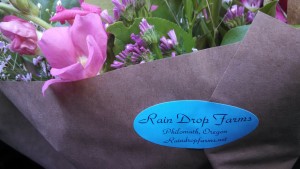 Fall is here and news from our Slow Flowers Tribe is exploding!
Fall is here and news from our Slow Flowers Tribe is exploding!
There are so many things to discuss and update you about this week. You’ll find that news at the bottom of this post, after I introduce you to Rain Drop Farms.
The heart of the Slow Flowers Podcast are my weekly conversations with inspiring voices in the American flower farming and floral community. Please meet today’s guests, Erin McMullen and Aaron Gaskey, the dynamic duo behind Rain Drop Farms. Based outside Corvallis, Oregon, in Philomath, this husband-wife team of farmers grows a wide array of perennials and annuals on three acres of healthy soil. Allow me to bring Raindrop Farms — and the sunshine they spread — to you, with the story of lovely, local, Oregon flowers and how one family makes a beautiful and creative living from their land.
Situated in the foothills of the Oregon coast range, Rain Drop has been providing fresh, local, specialty flowers to the Willamette Valley since 2000.
Passionate about growing flowers, Erin and Aaron count dahlias among their favorites. They grow more than 75 varieties and are always searching out more, as well as a wide variety of perennials and many different annuals.
Theirs is a working family farm. As Erin writes on the web site: “We live here, grow here and play here. Our children have grown up digging in the dirt and chasing rainbows here. As stewards of this beautiful place we strive to maintain and promote the diversity here. We use organic and sustainable practices throughout our farm. It is our belief that growing this way is just the right thing to do. It is the best for our farm, our family and flowers.”
I adore this couple. We’ve met in person on a few occasions, most recently when they took what I call a busman’s holiday to drive from Philomath up to Mt. Vernon, Oregon, (about 325 miles away) to spend a few days volunteering at the Field to Vase Dinner held on Sept. 12th at Jello Mold Farm. I simply couldn’t let the opportunity pass and am so thrilled that Erin and Aaron agreed to record this conversation.
Last week, Erin shared with me a fascinating conversation she had with a Farmers’ Market customer and I think it sums up what so many of us have experienced:
“We have had so many people ask us this year if we grow all of the flowers. Of course we say ‘Yes! Every last one!’ We are always surprised by how many people seem surprised by this! Yesterday we had a guy come up and ask if we grew all the flowers; the conversation progressed and he tells us that he works with flowers in LA and didn’t realize that there were people like us who actually grew flowers like these domestically.
His business is selling flowers at college graduations and he said that they buy most things from Ecuador and South America, basically saying that domestic flowers were just too pricey.
Aaron told me later that he could see me high jump onto my soap box, but I let (the customer) know what I thought of that excuse and that supporting American farmers is a more sustainable long term economic strategy.
He actually took pause and then asked for our contact info and for the name of the Slow Flowers website again, saying that he was intrigued and would like to learn more.
I’m telling you this story, though I’m sure you hear this kind all the time, because it was so refreshing to me. Also, because of you and your efforts, I have become more well informed and confident about my convictions that American flower farmers deserve a chance to thrive in a domestic marketplace. So, thank you! So glad that we met and that we’ve had an opportunity to get to know each other a little better! :)”
Thank YOU both Erin and Aaron! I couldn’t agree more.
Follow Rain Drop Farms on Facebook
Follow Rain Drop Farms on Instagram
More news to share!!!
Here is a just-released clip about The Flower House, created by Hello Future Films, that shows recent footage captured during the installation of the preview exhibit earlier this year – it’s being shown to stimulate ticket sales for The Flower House show dates, October 16-18. If you’re anywhere near Detroit, hop on over to see this amazing display!
And then, with much fanfare, I’m so pleased to share with you “Field to Vase: Santa Cruz,” a 7-minute, 39 second documentary produced, filmed and edited by my friends Haejung Kim and her husband Moon, a LA-based couple of creatives whose probono efforts have beautifully captured the story of American grown flowers and the renaissance we are all helping make happen. Click here to read my recent Q&A with Haejung and Moon.
I have a cameo role in the film, but please don’t take this as blatant self-promotion. It’s all about the cause of promoting American flower farms, American flowers and the florists who create such beauty with intent. You’ll also meet flower farmer Paul Furman whose family owns California Pajarosa Roses and Slow Flowers member Teresa Sabankya, of Bonny Doon Garden Co., who was the guest designer at the Field to Vase Dinner held at Pajarosa Roses this past June. The film is beautiful, poignant and I encourage you to watch it and share it widely.
Martha Stewart American Made Taps Two Slowflowers.com Members
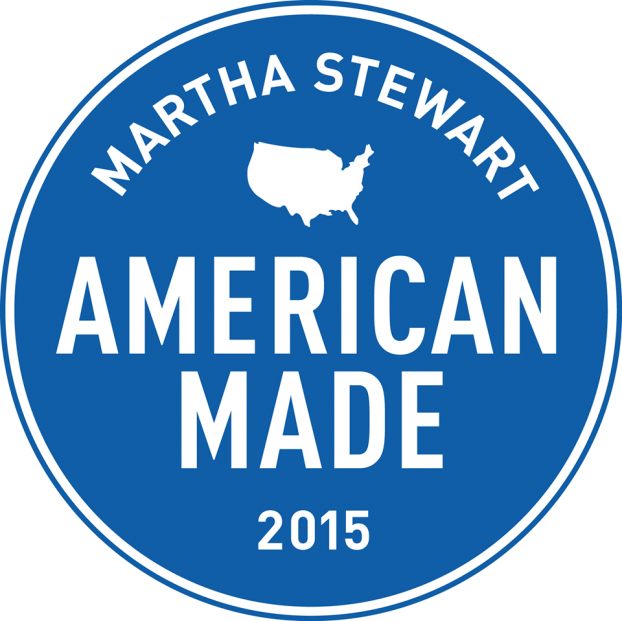 I want to showcase the many people in our community whose work has earned them FINALIST status on the Martha Stewart American Made 2015 campaign.
I want to showcase the many people in our community whose work has earned them FINALIST status on the Martha Stewart American Made 2015 campaign.
I am especially excited that Susan McLeary of Passionflower, a Slowflowers.com member based in Ann Arbor, Michigan, is a finalist – the only floral category finalist – in the Design Category. Check her out here.
And flower farmer Wanda Fox of Illinois-based Fox & Co. is a finalist in the Craft Category for her beautiful charcuterie boards made from salvaged and reclaimed black walnut lumber. Check her out here.
I also want to put in a plug for my friend Andy Chapman of Stumpdust. Andy is a finalist in the Design Category for Gardening & Outdoor Living, for his unique garden stakes and tools fashioned from salvaged wood. Andy’s work is exquisite and he is the genius behind my American Made shadowbox that I used to display my 2015 Northwest Flower & Garden Show floral entry. You can see photos of that beautiful work here. And please check out Andy & Stumpdust on MSL here.
Get Your Hands on Floral Soil!
Another Slow Flowers Podcast friend who is near and dear to my heart is Mickey Blake of Floral Soil, the innovative, plant-based, 100% biodegradable alternative to formaldehyde-based flower foam.
Mickey has just introduced a fun new product called “Floral Soil Cupcakes,” a perfect gift or DIY project that is one of the perks in her two-week Indiegogo fundraising campaign that continues through October 10th. Many of us have been waiting for Floral Soil to kick into full-scale production because we can’t wait to get our hands on this earth-friendly design product. By supporting the Floral Soil Indiegogo campaign, for as little as $15 you can get your hands on a cute cupcake-shaped base for planting succulents or arranging flowers – and you can help push Floral Soil to the next level where commercial production of those must-have bricks will begin before the holidays.
Episodes of the Slow Flowers Podcast have been downloaded more than 66,000 times. I thank you and others in the progressive American-grown floral community for supporting this endeavor.
Until next week, you’re invited to join me in putting more American grown flowers on the table, one vase at a time. And If you like what you hear, please consider logging onto Itunes and posting a listener review. THANK YOU to each and every one of you for downloading, listening, commenting and sharing. It means so much.
The content and opinions expressed here are either mine alone or those of my guests alone, independent of any podcast sponsor or other person, company or organization.
The Slow Flowers Podcast is engineered and edited by Andrew Wheatley and Hannah Holtgeerts. Learn more about their work at shellandtree.com.









